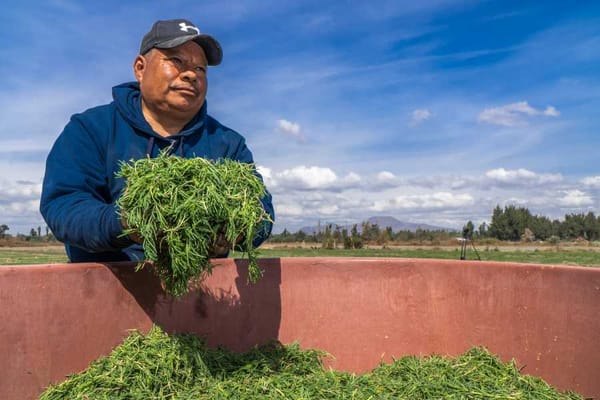Who was Benito Canales Godínez? The restless life of a heroic bandit
Benito Canales was born in 1882 in Tres Mezquites, Michoacán state. He grew up as a farmer and, for unknown reasons, killed the creditor Donaciano Martinez and fled to California. He was later taken prisoner by California authorities and before he could be deported, he escaped from prison.

Among the stories that the older generations have told about the Mexican Revolution, always come to light the heroic deeds of that moment starring men, anonymous or socially recognized, who stand out for their rebelliousness, for their bravery, but also for their misdeeds, which made them the object of persecution of various kinds.
Many of these exploits are sung in Mexican corridos, which although they inherit their structure from the old Spanish romances, are expressions of Mexican popular culture directly linked to oral tradition. One of the best-known Mexican corridos is a testimony of the life of Benito Canales.
The restless life of Benito Canales Godínez begins in the year 1882, in the ranch of farmers located in Tres Mezquites, belonging to the hacienda of San Martín, municipality of the city of Puruándiro, state of Michoacán de Ocampo, and ends on October 16, 1912 in the hacienda of Surumuato, located in the same municipality of Puruándiro de Calderón, Michoacán.
Benito Canales' parents were Mr. Máximo Canales and Mrs. María Refuglo Godínez. Benito had four brothers: Crescencio, Rafael, Melecio and José. In his youth, Benito married Miss Crescencia Ramírez, with whom he had a son named Mariano Canales Ramírez.
To visit the ranch of Tres Mezquites, take the local road that leads from Puruándiro to Janamuato (Xanamu Juato, "hill of lava", a Michoacan word); then follow the road that goes to Villachuato to reach Agua Gorda and then you will find Tres Mezquites; further on you will find the town of Pastor Ortiz.
By leap of faith
According to the law of the territorial division of 1910, issued by Aristeo Mercado, governor of the state of Michoacan, the district of Puruandiro was composed of the municipality of the same name and those of Morelos, Huaniqueo, Coeneo, Panindicuaro, and Angamacutiro, Michoacan. In 1910, the state of Michoacan was divided into 16 districts, with their municipalities, local governments, and estates. The crimes that were committed at the time were:
Abuse of employment or peculation
Abuse of authority and injuries
Assault with a firearm
Aggression to the agents of the authority
Serious threats
Breaking
Abuse of trust
Damage to other people's property
Disobedience
Falsehood
Falsification of documents
Fraud
Escape
Homicide
Infanticide
Arson
Injury
Lesions
Escape Protection
Graft
Carrying of weapons
Arbitrary imprisonment
Theft
Kidnapping
Brawl
Armed resistance
Resistance to the authorities
Suspected robbery
Attempted rape.
Attempted kidnapping
Assault and battery with a weapon against an officer of the authority.
Usurpation of functions or powers
Outrages against authorities and carrying of weapons
Rape and other crimes
Thus, in 1905 there were 13 injuries and 8 homicides, in 1906 there were 8 injuries and 10 homicides, in 1907, 18 injuries and 27 homicides, in 1908, 12 injuries and 18 homicides, in 1909, 13 injuries and 32 homicides, in 1910, 11 injuries and 37 homicides.
From 1905 to 1910, the dynamics of crime grew considerably. During this period, 75 injuries and 132 deaths were recorded for different causes. These crimes altered the conditions of peaceful existence in the territory of the district of Puruándiro, Michoacán, and opened the floodgates of hatred and revenge of the offended towards the delinquents and their families. And if we imagine how many crimes could have been committed in the 16 districts that made up the state of Michoacán in 1910, we can conclude that the hallmark of social life there - as in the whole country - was violence.
Most of the inhabitants of Mexico could not read, out of 13.1 million only 2.9 million could read and write and there were cities and regions where no one could do so.
It is true that during the government of Don Porfirio Díaz, primary schools were established in the Federal District and other states of the country, as well as secondary schools, normal schools, and higher schools; The University of Mexico was reorganized and the Faculty of Higher Studies, which was at the same time, Faculty of Letters, Faculty of Sciences, Superior Normal School, School of Application for Graduates and Coordination Centers of the Institutes of Scientific Research, were reorganized. Thus, the government of Porfirio Diaz abandoned the education of the children of the workers and only protected the youth of the rich.
On the other hand, the Porfiristas maintained that some men were superior and others inferior, consequently, the latter had to be subjugated to the former; this fact was evident in the working relationship existing between the peasant and the large landowners, as well as between the industrialists and the workers. There was no regulation in the provision of services, the peasants had to work from dawn to dusk, they were mistreated, the salary consisted of a few cents. The boss was not interested in whether the worker lived well or badly since that was not his business; it was not up to the landlord to solve the problem of education, health, housing, or food on behalf of the worker. Life was short, men became useless at the age of forty or fifty, and the landowner only employed young people.
To impose the Porfirian ideology, the regime counted on the army, the political bosses, the mounted police, etc. And they said that the power of the Mexican State should be aimed at favoring the benefit of the strongest, the owners of wealth and culture. There was also the death penalty, the "escape law", the "kill them in the heat of the moment", the prisons. The political bosses and the hustlers could arrest anyone, imprison them and then sell them to the owners of the tobacco and henequen plantations in Yucatan and Tabasco, or in the coffee plantations in Chiapas; some were sent to Valle Nacional in Oaxaca or banished to Cuba.
This was the environment in which Benito Canales was formed, orphaned of an official education that would serve as a guide to modify his attitude towards reality and correct the system of production, consumption, and distribution of municipal, state, and national wealth. However, using the work habits and the accumulation of the productive experience of the region of Puruándiro, Michoacán, Benito Canales made an effort, to the extent of his possibilities, to modify those relations between the landowners and the farmworkers, since he knew, from his childhood, the work tools used in agriculture and knew how to use them; he knew the men and their desire to transform the relations of production, distribution and consumption of the local wealth. In fact, Benito Canal worked as a laborer in the hacienda of Berapaz, where Mr. Donaciano Martínez was the paymaster.
On many occasions, Mr. Donaciano Martínez did not pay the workers of the estate and kept the money to use it for his benefit. This fact produced great discontent among the laborers who hated him because they worked all week long from sun up to sun down and then did not receive their pay. Mr. Benito Canales Godínez, experiencing this situation, intervened by asking Mr. Martínez for the money and then paying the laborers personally, thus gaining the sympathy of the ranch workers.
On September 21, 1909, Mr. Donaciano Martinez was murdered at a point located between Surumuato and Tres Mezquites and the only witness for the prosecution was Mr. Benigno Piceno, Benito Canales' brother-in-law and servant of Mr. Martinez, who affirmed in his statement.
"... that he, the witness, was walking with Donaciano Martinez on September 21, 1909, returning from the hacienda of Berapaz to the ranch of Tres Mezquites and, when it was almost dark at a point on the road, located between Surumuato and Tres Mezquites, Benito Canales, an acquaintance, and friend of Martinez, came out of a nopal plantation and proposed a gun for sale to the latter, and not having accepted the proposal, Canales fired the same gun at Martinez and the latter fell dead, without having mediated between the two any more words or displeasure. He also said that on the occasion of the event, the declarant questioned Canales for his behavior and the latter also shot at the deponent, failing to wound him and left; ..."
Apprehended and placed at the disposal of the court of the first instance of the city of Puruandiro, Michoacan, the accused Benito Canales Godinez, in his preparatory statement said:
"... that he knows Donaciano Martinez and Benigno Piceno and that with the first one he had no other antecedents than to owe him a favor; but with the other, he has been linked by affinities, since they are brothers-in-law; that he has no responsibility in the death of Martinez."
The murderer of Donaciano Martinez could have been one of the peons of the Berapaz hacienda who hated him, for the reasons already indicated above, but Mr. Benigno Piceno had an aversion towards Canales. Besides, the owner of the plantation did not like the presence of Benito Canales in the region, because he was the leader of the peons who worked there. As he was the only eyewitness to the murder, Piceno could very easily make his brother-in-law criminally responsible. The truth is that the judge of the proceedings issued a sentence in which he condemned Canales to suffer a prison sentence of three years, one month, and 15 days, according to a ruling dated February 29, 1912.
On that date, Benito Canales was admonished not to repeat the crime of homicide, but in April of that year Canales Godínez escaped from the Puruándiro jail and, for that reason, on April 10, 1912, the judge issued a new arrest warrant and issued the summons of the East, West and South Winds of Puruándiro, Michoacán, so that Benito Canales would be arrested and imprisoned again.
Benito Canales evaded the action of justice until one day he was located at the point called Maritas, corresponding to the State of Guanajuato, where he repelled with his weapon in his hand a strong attack carried out by the Porfirian army. As he was entrenched in a strategic place, the armed forces could not dislodge him and the attacker suffered many casualties, which made it very angry. The combat lasted several hours; according to Doña Carmen Canales and Mr. Eligio Rodríguez, the battle began at five in the morning and ended at five in the afternoon.
Subsequently, Canales returned to Surumuato where he hid in a house, being discovered by the rural people through information given by a man to the army forces of the Porfirian government; he decided to lay down his arms to prevent a priest from being killed. Benito Canales Godínez was taken prisoner and executed by the army that had been pursuing him in the Surumuato hacienda on October 16, 1912. By orders of the Prefect of the District of Puruándiro, the body of Benito Canales was placed in a basket on a tule mat and taken to the city of Puruándiro to be buried in a common grave in the cemetery of that city.
Benito Canales Godínez was of medium height, of vigorous physical constitution, dark brown hair, and eyebrows, thick nose and mouth, a scarce goatee; his face was oval, with an expression of nonconformity and disappointment. At the time he was shot he was wearing a white shirt, dark jacket, jeans, and sandals.
The behavior observed by Benito Canales, as we have seen, was determined by the social conditions in which he lived; his ideology was formed under the influence of the main problems of injustice, lack of a school and social services, as well as the imposition of an authoritarian system of government. For these reasons, Benito Canales was not satisfied when he saw that the peons were not paid well and that they were made to work from sunrise to sunset, he thought that to be satisfied with that situation was to be dead in life and he always demonstrated his indomitable courage When he was told: -Benito, they are looking for you, he answered with singular arrogance: -Even if they were a hundred rural workers I would wait for them with eagerness.
Corrido of Don Benito Canales
The corrido of Benito Canales is a heroic corrido that praises the pre-revolutionary bandit. But there are some discrepancies among historians about the details of the real-life of Benito Canales, as there are about ten deferred versions, as well as a film version and a monument to his memory.
(Translation from Spanish)
Year of nineteen hundred,
on the thirteenth that passed
Benito Canales died,
the government killed him
He went from store to store
looking for ink and paper,
to write a letter
to his beloved Isabel
Benito Canales said,
leaving Villachuato:
-I'd better see my dear
who stayed in Surumuato
Jesus Ibarra answered:
Go with great care,
tomorrow at ten o'clock we'll see each other
at ten o'clock tomorrow at the Ojo de Agua.
When he arrived in Surumuato
his beloved told him".
-Benito, they are looking for you,
that's what I heard.
Don Benito answered
with unparalleled arrogance".
-Even if they were a hundred rural people,
I await them with eagerness.
He returned home,
with great resolve,
prepared his weapons very well
and waited for the commission
When the government arrived
everyone came asking:
-Where is Canales
that we came looking for him?
A woman from Guadalajara
was the one who gave them a reason:
-Now he has just entered,
go without delay
When the troops heard this
they soon surrounded the house.
That ungrateful woman
was the cause of his misfortune
Then they marked the stop,
shouting the Federals:
Long live the Supreme Government!
Death to Benito Canales!
Don Benito answered them:
-Now, devils from hell,
Long live Benito Canales!
Death to the Supreme Government!
Benito Canales rode out
on his red horse,
with his weapons in his hands,
fighting with thirty-five
He began to shoot bullets
at all the Federals,
killing men and horses
and doing barbarities
Benito Canales said.
Come on in, you, evils,
I am not afraid of you,
even if you come well-armed.
He was already beating them
because he had plenty of courage,
when help came to them
from that Cuitzco de Abasolo.
There where the battle took place
of Don Benito Canales,
you could no longer see the
horses and rural people.
When he saw such carnage
the father chaplain came out
from his humble chapel
to speak with the captain
Said the father chaplain:
-I am going to appease him;
Don't fight with Canales anymore,
for I am going to confess him
To the poor little father
the colonel replied:
-If you don't take away his weapons
today you die together with him
He went walking on his knees
to meet Don Benito:
-Son of my heart
make yourself so peaceful
Said, Benito Canales
-Father of my life,
how is it possible that you come
to meet me on your knees?
The chaplain answered him:
-I have come to confess to you,
I want you to lay down your arms,
I want you to lay down your arms, for, at last, they will kill you.
You must also make
an act of contrition,
to see if by this means
of God, you will obtain forgiveness
He got off his horse
all regretful;
he no longer began to think
so many dead and wounded.
To be able to confess it
first, he disarmed himself,
took off his chinstrap
and then he confessed
Benito Canales said
after he confessed:
-I want to fight another time,
now that I am rested
But the father chaplain
would no longer let him say:
-"Oh son, if you take up arms, I too must die.
I must die too.
Don Benito answered him:
-For my sake, he will not be lost,
for rescuing his life
I will no longer do my duty
Then Benito Canales
said to the nearby soldier
-Do with me what you want
now that I am unarmed
Tied up and smiled
and told the Acordada
I am from pure Guanajuato,
but now I'm worthless.
The rural people captured him
taking him to Surumuato,
and when he said goodbye to his father
sent Isabel his portrait.
Then they formed the picture
without letting him be blindfolded;
to the right of the father
he was well shot!
Benito Canales said
when he was dying:
-They killed a fine rooster
respected rooster of the Government.
When his forces arrived
to the Ojo de Agua mentioned,
they found Don Benito Canales
they found him buried
Don Benito Canales was
a man of ability,
he gave his life for his father
of very fine will
They said that he carried the devil
in a bronze box,
and the very devil he was carrying
was his eleven-gauge rifle
Here ends the corrido
of don Benito Canales,
a woman from Guadalajara
handed him over to the federals
With this one, I say goodbye
at the foot of beautiful rose bushes
here end the verses
of Don Benito Canales.
I have already sung this corrido
with sadness and regret,
and if it was not well sung
I think I will be excused.
Author: Felipe Chávez Cervantes




